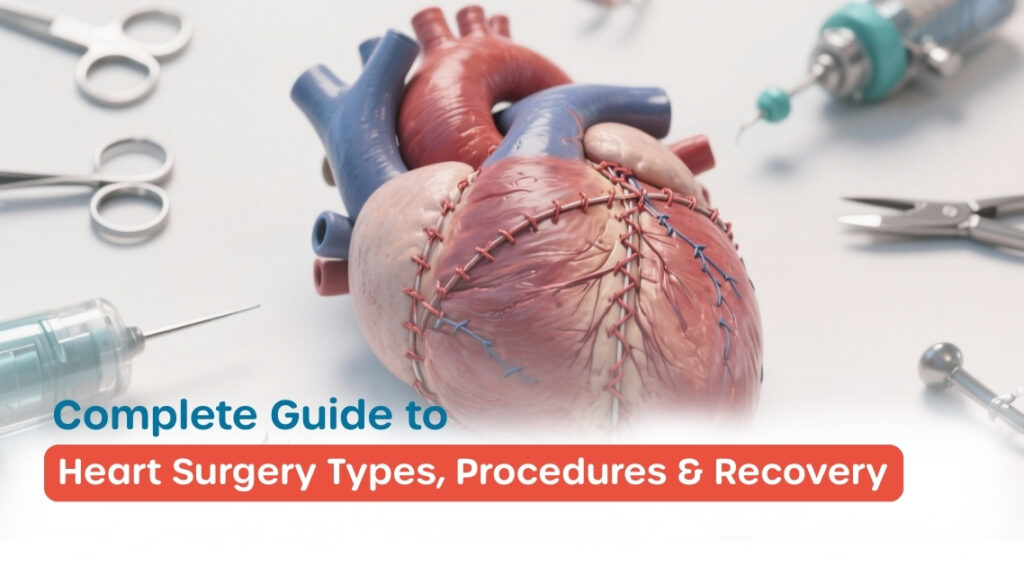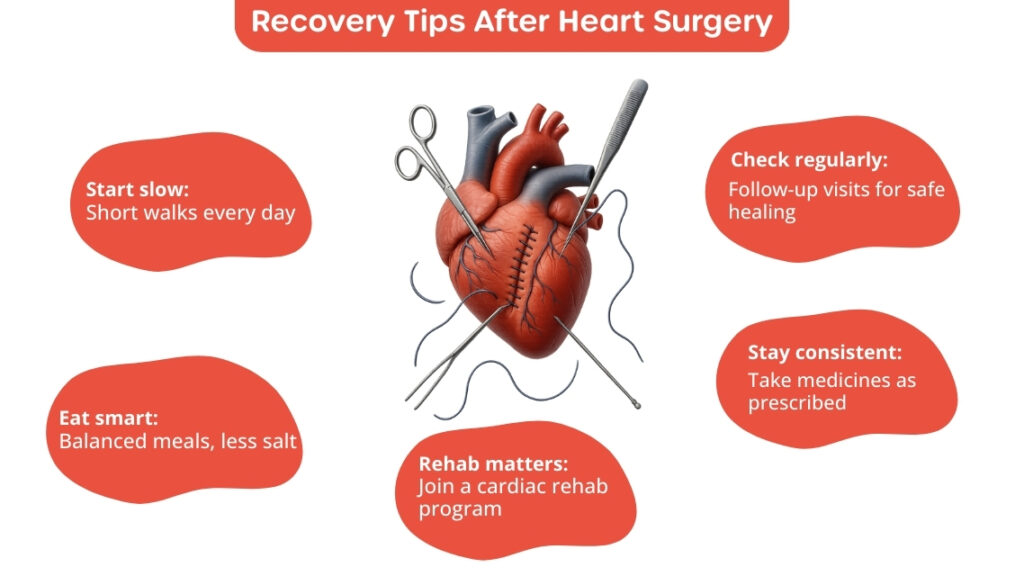
Heart disease remains one of the leading causes of death worldwide. While medications and lifestyle changes can control some conditions, many patients eventually require surgery to restore proper heart function. From bypass operations to valve repair, device implants, or even a heart transplant, each procedure is chosen based on the patient’s condition and overall health.
The most common heart surgery types are coronary artery bypass grafting (CABG), valve repair or replacement, minimally invasive cardiac surgery (MICS), device implants, and heart transplant.
At Shinon Healthcare, we connect patients with the best heart transplant hospital in India and provide complete care coordination as a trusted Healthcare Consultancy
Keep reading to understand the different procedures, how recovery works, and the risks you should know.
Understanding Different Types of Heart Surgery
Different heart surgery types are recommended depending on the patient’s condition and severity of disease.
Coronary Artery Bypass Grafting (CABG)
CABG is one of the most common heart surgery procedures. In CABG, surgeons use a healthy blood vessel to create a new path around blocked heart arteries, improving blood flow. Variations include off-pump CABG (OPCAB) and beating-heart surgery, which do not require a heart-lung machine.
Valve Surgery
Heart valves control blood flow inside the heart. If they are damaged, surgery may be required to repair or replace them. Options include:
- Aortic valve replacement (SAVR or TAVR/TAVI)
- Mitral valve repair
- Bioprosthetic valve or mechanical valve implantation
These may be done through traditional open-heart methods or minimally invasive cardiac surgery.
Devices and Implants
For patients with rhythm or pumping problems, devices may be implanted, such as:
- Pacemaker implant
- Implantable cardioverter defibrillator
- Ventricular assist device
- Total artificial heart
Other Specialized Surgeries
Some advanced procedures include the maze procedure for irregular heartbeat, aneurysm repair, robot-assisted bypass, and hybrid cardiac surgery that combines open and minimally invasive methods.
Heart Transplant
When the heart is severely damaged and no other treatment works, a heart transplant may be the only solution. This requires expert teams, advanced facilities, and careful post-transplant care, which is why choosing the best heart transplant hospital in India is essential.
Understanding the Complete Heart Surgery Procedure
Every heart surgery follows a structured process to keep patients safe and ensure the best results. The steps include:
- Pre-operative evaluation: Doctors first check the patient’s overall health with tests such as an echocardiogram, CT or MRI scans, and diagnostic catheterization. They also review medical history, comorbidities, and anatomical suitability to decide if surgery is the right option.
- Surgical planning: Based on these results, the surgical team prepares a detailed plan. This includes choosing the type of anesthesia, deciding whether traditional or minimally invasive techniques such as percutaneous access or hybrid operating room setups are appropriate, and selecting the safest approach for the patient.
- During surgery: Depending on the procedure, surgeons may use a heart-lung bypass machine or perform off-pump surgery (beating-heart surgery). In some cases, robotic or minimally invasive cardiac surgery (MICS) techniques are used for faster recovery and fewer complications.
- Postoperative care: After surgery, patients are moved to the ICU for close monitoring. Doctors track vital signs, manage pain, and check for early complications. As recovery progresses, patients shift to a step-down unit where chest physiotherapy, wound healing, rehabilitation support, and early mobility are started to aid recovery.
Recovery After Heart Surgery
Heart surgery recovery is as important as the operation itself. Proper care after surgery helps patients heal well and regain normal life.
- Hospital stay duration: Most patients do spend a few days in ICU typically 2-3 typically days, followed by a general ward stay of 4-7 days. This is consistent with global recovery protocols.
- Short-term recovery: Includes pain management, infection risk reduction, faster healing, and less pain in minimally invasive procedures.
- Cardiac rehabilitation: Rehab is essential and includes structured exercise, chest physiotherapy, diet, and lifestyle modification.
- Long-term surveillance: Follow-up is critical to monitor graft longevity, valve durability, implanted device performance, and detect complications early. Correct and important for patient education.
- Outcome: With good compliance, patients do return to normal daily activity in 6–12 weeks and enjoy improved quality of life.
Heart Surgery: Risks and Success Rates
Like any major procedure, heart surgery carries certain risks. Understanding these helps patients make informed decisions.
- General surgical risks: Bleeding, infection, blood clots, arrhythmia and anesthesia complications.
- Organ-related risks: In some cases, surgery may lead to stroke, kidney problems, lung complications, or other organ injury. Some patients may also experience memory loss or mild cognitive decline after surgery.
- Patient-specific factors: Risks are higher in elderly patients or those with diabetes, kidney disease, lung disease, peripheral artery disease, or multiple comorbidities. Emergency surgeries often carry more risk compared to elective ones.
- Mortality risk vs success rate: Despite these challenges, success rates for most heart surgery types remain high when performed at NABH- and JCI-accredited hospitals by experienced cardiac surgeons. Choosing the right hospital and care team reduces complications and ensures safer recovery.
Why Shinon Healthcare for Heart Surgery?
Patients not only need medical excellence but also complete confidence in their journey. That’s where we make the difference:
- 15+ years of trusted experience: Serving patients from more than 30 countries, we have guided thousands through complex treatments with compassion and professionalism.
- Partnerships with accredited hospitals: We work only with NABH- and JCI-accredited cardiac centers in India, known for their high success rates, advanced facilities, and strict international safety standards.
- World-class expertise: Our network includes highly experienced cardiac surgeons skilled in CABG, valve replacement, minimally invasive surgery, and heart transplants.
- Transparent and affordable care: Heart surgery in India can cost up to 70% less than in Western countries, with no compromise on quality. We provide clear cost breakdowns before treatment begins.
- International patient support: From visa assistance and airport pickup to travel coordination, language interpretation, and cultural support, we ensure patients and families feel comfortable throughout their stay.
- End-to-end care: Our team helps with check-ups before surgery, organizing the operation, and guiding recovery afterward. We also support families with advice on healing, diet, and lifestyle changes.
- Donor and transplant support: For patients requiring a heart transplant, we coordinate with leading hospitals that follow stringent protocols, ensuring both recipient and donor safety.
With this comprehensive approach, Shinon Healthcare has become one of the most trusted names in medical value travel, recognized as a leading medical tourism company in India for advanced cardiac care.
Conclusion
When going through a heart surgery what matters most is being in the hands of the right doctors, in accredited hospitals, with a team that supports you from the very first consultation to full recovery.
At Shinon Healthcare, we know patients look for safety, transparency, and compassion, not just medical expertise. That’s why we focus on clear guidance, cost clarity, and complete care for both you and your family.
If you are exploring options for bypass surgery, valve repair, or even a transplant, let us connect you to world-class specialists and trusted hospitals in India. Your health journey deserves the best care. Start it today with Shinon Healthcare by your side.
FAQ’s
How do doctors decide which type of heart surgery I need?
Ans. The decision depends on test results, artery blockages, valve condition, heart function, age, and overall health. Surgeons use imaging, catheterization, and risk assessment before recommending the best option.
Is minimally invasive heart surgery safer than open-heart surgery?
Ans. Minimally invasive cardiac surgery often has less pain, smaller scars, and faster recovery, but not all patients are suitable. Your surgeon decides based on anatomy and disease severity.
How long does a heart valve replacement last?
Ans. Mechanical valves can last a lifetime but require lifelong blood thinners. Bioprosthetic valves usually last 10-20 years and may need replacement later.
What is the success rate of heart surgery in India?
Ans. At accredited hospitals, success rates for most heart surgery types are above 90-95%. Outcomes depend on patient health, surgeon expertise, and timely care.
Can lifestyle changes reduce the need for surgery?
Ans. Yes, in early stages of heart disease, lifestyle changes like diet, exercise, and medicines may delay surgery. But advanced cases often require surgery for long-term results.
